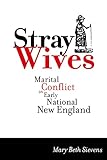Stray Wives : Marital Conflict in Early National New England / Mary Beth Sievens.
Material type: TextPublisher: New York, NY : New York University Press, [2008]Copyright date: ©2008Description: 1 online resourceContent type:
TextPublisher: New York, NY : New York University Press, [2008]Copyright date: ©2008Description: 1 online resourceContent type: - 9780814740095
- 9780814745342
- 306.872/0974/09034 22
- online - DeGruyter
| Item type | Current library | Call number | URL | Status | Notes | Barcode | |
|---|---|---|---|---|---|---|---|
 eBook
eBook
|
Biblioteca "Angelicum" Pont. Univ. S.Tommaso d'Aquino Nuvola online | online - DeGruyter (Browse shelf(Opens below)) | Online access | Not for loan (Accesso limitato) | Accesso per gli utenti autorizzati / Access for authorized users | (dgr)9780814745342 |
Browsing Biblioteca "Angelicum" Pont. Univ. S.Tommaso d'Aquino shelves, Shelving location: Nuvola online Close shelf browser (Hides shelf browser)

|

|

|

|

|

|

|
||
| online - DeGruyter A Race So Different : Performance and Law in Asian America / | online - DeGruyter Criminology Goes to the Movies : Crime Theory and Popular Culture / | online - DeGruyter A Hundred and One Nights / | online - DeGruyter Stray Wives : Marital Conflict in Early National New England / | online - DeGruyter Virtues of the Imam Ahmad ibn Ḥanbal : Volume One / | online - DeGruyter Would You Convict? : Seventeen Cases That Challenged the Law / | online - DeGruyter Legal Intellectuals in Conversation : Reflections on the Construction of Contemporary American Legal Theory / |
restricted access online access with authorization star
http://purl.org/coar/access_right/c_16ec
Whereas my husband, Enoch Darling, has at sundry times used me in so improper and cruel a manner, as to destroy my happiness and endanger my life, and whereas he has not provided for me as a husband ought, but expended his time and money unadvisedly, at taverns . . . . I hereby notify the public that I am obliged to leave him. Phebe Darling, January 13, 1796Hundreds of provocative notices such as this one ran in New England newspapers between 1790 and 1830. These elopement notices--advertisements paid for by husbands and occasionally wives to announce their spouses' desertions as well as the personal details of their marital conflicts--testify to the difficulties that many couples experienced, and raise questions about the nature of the marital relationship in early national New England.Stray Wives examines marriage, family, gender, and the law through the lens of these elopement notices. In conjunction with legal treatises, court records, and prescriptive literature, Mary Beth Sievens highlights the often tenuous relationships among marriage law, marital ideals, and lived experience in the early Republic, an era of exceptional cultural and economic change.Elopement notices allowed couples to negotiate the meaning of these changes, through contests over issues such as gender roles, consumption, economic support, and property ownership. Sievens reveals the ambiguous, often contested nature of marital law, showing that husbands' superior status and wives' dependence were fluid and negotiable, subject to the differing interpretations of legal commentators, community members, and spouses themselves.
Mode of access: Internet via World Wide Web.
In English.
Description based on online resource; title from PDF title page (publisher's Web site, viewed 01. Nov 2023)


